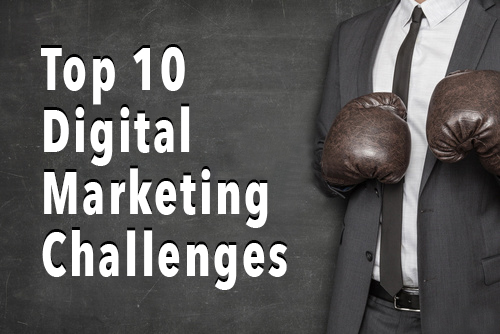Are You Facing Digital Marketing Challenges?
Digital transformation is in full swing, and companies are doing their best either to stay one step ahead, or at least, to keep up with the market.
The economic downturn of the last few years forced brand owners to try digital. Ever since, more and more are making the transition and allocating more spend to digital. And there’s no going back!
But being a marketer has never been more challenging!
Although we typically share similar goals, but every marketer faces different challenges. Some are up against internal resistance, others are having trouble finding qualified talents, while some are still not sure what’s the right technology for their needs.
Whatever the case may be, there’s always at least one area that you can improve. In other words, there’s always room to optimize the various components of your strategy and turn your marketing into an even more effective revenue generator.
Here Are Some of the Most Common Challenges Marketers Struggle With:
1- Proving ROI of Digital Marketing Activities
Measuring the return on investment (ROI) of your digital activities may seem an easy and accurate task with level of details tools like Google Analytics, Facebook Insights and hundreds of others can provide. But one of the most challenging tasks marketers actually have is defining ROI for their digital marketing activities. This is mainly due to the following reasons:
- Different Metrics and KPIs: Since digital tactics are so new and so different from traditional channels, their metrics are too.
- Benchmarking: In most cases, marketers don’t have precedent figures to compare to.
- Intangible Results: Particularly when justifying activities that mostly contribute to brand building, community building and customer service. Their return is not concrete and their effect is very likely to be long term.
- Indirect Results: Unless you’re in the ecommerce business, you don’t have a two-way communication between your digital activities and sales reports. That makes it almost impossible to isolate digital and validate its effectiveness.
- Lack of Time or Resources: Digital provides detailed, accurate and realtime metrics. But in order for this abundance of information to be useful, marketers need to check their analytics frequently (or have someone on their team do so). This requires time and/or resources.
2- Securing Enough Budget for Digital Activities
Marketers know that getting more budget is often easier said than done – especially for old-school management or smaller organizations that aren’t working with sizable nor flexible marketing spend.
Many brands are still struggling with getting enough funds allocated to “digital.” The less B2C the brand is, the harder it is. Much of this is due to the lack of a clear path from money invested to actual sales.
Digital is now an important element of the marketing mix. However, with the increasing economic challenges, we are asked to do more with less. This suggests that although objectives, audiences and territories are expanding, budgets and resources are not.
But again, this might be the exact reason why “digital” has become more important than ever!
3- Finding the Right Digital Mix
Again with the lack of previous data, finding the right marketing mix is one of the challenges marketers are facing.
Many companies have already done a bunch of digital “Experiments”. Now, when their CFOs are breathing down their necks and asking for results and metrics, they are taking a step back and reassessing whether those tactics yielded any business impact. In most cases, they haven’t.
But going forward they are looking for ways to make digital and traditional marketing tactics work better together and drive real business return.
Take social media for example. These digital arenas can be a great opportunities to engage with customers and build communities, but for some types of product, services or objective they might not be the ideal solution. Organically ranking your brand on search engines might take longer time and harder to sustain but their impact might override all other traditional and digital marketing activities. B2B businesses might focus on a mix of affiliate marketing, inbound marketing and email marketing to achieve results.
Drafting a digital plan is not rocket science, but only people with a holistic experience in digital and a clear understanding of its different channels will be able to compose a strategy that really fits your brand and works seamlessly with your mainstream strategy.
4- Finding, Keeping and Training Talents
Hiring and keeping these people who can help you on the digital side of marketing has been very difficult. Supply simply isn’t keeping up.
Designing customer interactions is as much an art as it is a skill. The best people will naturally be drawn to companies that do interesting, cutting edge stuff. That means that non-technology companies or startups will find it very hard to attract high caliber and experiences digital talents.
On the other hand, marketers find training their team to be an equally tough job.
Whether it’s training your team on the concepts and tools they’ll be using every day or making sure they’re achieving their full potential, training cannot be achieved without disrupting their regular tasks.
5- Organizational Structure and Knowledge Sharing
In many large organizations, departmental silos were created originally for the purpose of standardization and efficiency.
Unfortunately, in the fast-moving digital marketing world, these very silos now mean incredible inefficiency, slowness to react to opportunities, and knowledge gaps.
While most companies don’t have the luxury of reorganizing, there are processes that can be put in place to increase knowledge sharing and speed.
6- Staying Up-To-Date
Digital is constantly and quickly evolving. One should always be up to speed and well prepared with what’s happening in terms of technology, design, content, user experience and trends.
Keeping up with the advancement of technology while still struggling to learn the basics of digital is like swimming against the current. You either have to hire experienced talents (which is very difficult as I earlier mentioned) or overwhelm yourself and your team so that you all catch-up.
7- Keeping Up with the Speed
In digital channels, marketing can happen at light speed – actually, in real time.
Once you run a campaign, you can immediately see users’ actions and reactions. No longer does it take months to compile data and write performance reports. With this comes the ability to instantly optimize your activities.
But too often, companies don’t have processes in place to enable the quick reaction to problems or opportunities.
8- Contextual Adaptation
In traditional marketing, an integrated campaign is about hammering the audience with the same message across all channels in order to create a collected build.
In digital however, campaigns must employ a holistic approach in order to be effective. Your content should be sensitive to every situation, technology, platform, context or content you plan to use.
9- Managing Websites
Managing a website is one of the biggest challenges for marketers – especially for small companies fighting to reach the growth phase, as well as for nonprofit organizations.
Your website’s performance is – and should be – high on your list of priorities. It’s an asset that works around the clock to draw in visitors, convert them, and help you hit your goals, after all.
Issues with website management includes a variety of different factors, from writing and optimizing the content to designing beautiful webpages.
10- Finding the Right Service Providers
Digital has revolutionized the marketing industry and created immense opportunities for new companies and individuals to offer their services to all sorts of brands and businesses. After all, there is a great and growing demand.
Finding the right partners to help you plan, design, develop, execute and optimize you digital marketing activities could be a “Make It Or Break It” decision.
Big and fancy digital agencies might not be able to give you the same dedication – with the same skills and at the same cost – as an experienced digital consultant could offer you. On the other hand, not all advisors or freelancers are reliable and working with them on a mandate-based relationship might not be what you’re looking for.
Additionally, some marketers feel unsure whether to hire the most expensive company or to hand their business to a competitive offer. For all they know, both presented more or less the same solutions, have worked with reputable brands in the past and offer the same list of services. There is nothing other than cost that sets them apart.
One thing I can assure you is that fees and rendered services are not in any way proportionate.
Finding someone that can help you overcome all those digital obstacles and partner with you to build your digital marketing.. is by itself, yet another challenge!
ARE YOU FACING ONE OF THOSE DIGITAL MARKETING CHALLENGES?
Drop me an email at hello@adibnachabe.com and I will be happy to help.
Copyright ⓒ 2016 – Adib Nachabé | All Rights Reserved

